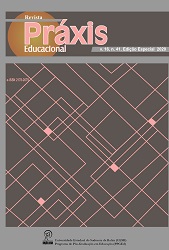SCIENTIFIC INITIATION IN HIGH SCHOOL INTEGRATED TO PROFESSIONAL EDUCATION: PERCEPTIONS OF COORDINATORS
DOI:
https://doi.org/10.22481/praxisedu.v16i41.6342Keywords:
Professional education, High School Integrated with Professional Education, Scientific researchAbstract
This study analyzes the perceptions of campi research coordinators from the Federal Institute of Education, Science and Technology of Rio Grande do Sul (IFRS) about Scientific Initiation (CI) in high school integrated with professional education (EMIEP). Consisting of a qualitative approach, such as a case study, it was developed through bibliographic and field research involving the IFRS Campi research coordinators. An online questionnaire was applied to the referred coordinators divided into two sections: the first sought to outline a profile of the coordinators and the second, to understand the motivations that determine their participation as research coordinators, the main limitations found in the development of their activities, the contributions of scientific initiation to the student, as well as perspectives on this practice within the institution. The data obtained were analyzed from the contributions of Arantes and Peres (2015), Bianchetti et al (2012), Cabrero and Costa (2015), Cruz, Santos and Santos (2015), Demo (2011), Freire (1996), Gil (2008, 2010), Oliveira and Bianchetti (2018), Pires (2015), Nascimento, Morosini and Guedes (2015) among others. The results indicate characteristics of the CI scenario in IFRS present mainly in the context of EMIEF. It points out that this is still an incipient activity, but that it is being developed based on actions that intend its expansion and strengthening. It is a reality that needs to be expanded, disseminated and fostered by campuses in order that a greater number of students and teachers can enjoy the contributions of CI to their training.
Downloads
Downloads
Published
How to Cite
Issue
Section
License
Copyright (c) 2020 Práxis Educacional

This work is licensed under a Creative Commons Attribution-ShareAlike 4.0 International License.
Você é livre para:
Compartilhar - copia e redistribui o material em qualquer meio ou formato; Adapte - remixe, transforme e construa a partir do material para qualquer propósito, mesmo comercialmente. Esta licença é aceitável para Obras Culturais Livres. O licenciante não pode revogar essas liberdades, desde que você siga os termos da licença.
Sob os seguintes termos:
Atribuição - você deve dar o crédito apropriado, fornecer um link para a licença e indicar se alguma alteração foi feita. Você pode fazer isso de qualquer maneira razoável, mas não de uma forma que sugira que você ou seu uso seja aprovado pelo licenciante.
Não há restrições adicionais - Você não pode aplicar termos legais ou medidas tecnológicas que restrinjam legalmente outros para fazer qualquer uso permitido pela licença.












